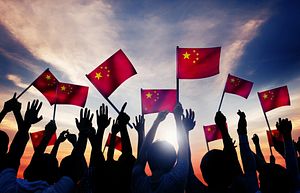China declared on Wednesday that it will provide household registration permits (known as a hukou in Chinese) to around 13 million unregistered people. The announcement came in a statement from the Central Leading Group on Comprehensively Deepening Reform, led by Xi Jinping himself.
In China, citizens are issued a hukou based on their place of residence. The permit allows people to access basic social services, from medical insurance to schooling for children. The hukou system is often discussed in the context of rural-to-urban migration, as migrant workers can find it nearly impossible to get a hukou in their new place of residence.
But, as The Diplomat reported earlier this year, around 13 million Chinese lack any form of hukou – largely because they were born in violation of the one-child policy or born out of wedlock. For many families, their children are denied hukous – and thus an education – simply because the family cannot afford to pay the fines associated with breaking the one-child policy. Now that China has scrapped the one-child rule, moving to let all couples have a second child, the discrimination against these unregistered Chinese looks even more out of place.
The central government in China is well aware of the social issues caused by the hukou system, and has been moving to make changes (albeit slow and gradual ones). On Wednesday, China’s major reform group took a more sweeping step, declaring that all unregistered citizens should be granted hukous. “It is a basic legal right for the Chinese citizens to lawfully register for hukou,” a statement from the leading group said, according to Xinhua. “[E]very citizen’s right to hukou should be protected in accordance with the law.”
The group declared that hukou registration should not be blocked by family planning limits or other policies. In addition to second children, Xinhua identified orphans, the homeless, and people “who have simply lost” their hukous as part of the unregistered group. But the one-child policy seems to be the biggest culprit; the meeting specifically called for hukou registration to be detached from family planning policies.
The meeting called for getting an accurate count of unregistered Chinese, as well as their distribution throughout the country and the reasons for their predicament. The government estimates there are 13 million, but given the difficulties of counting unregistered citizens, some Chinese scholars think the actual figure could be even higher. The meeting stressed that the hukou reform should be carried out in coordination with perfecting national policies on family planning, adoption, homelessness, and national citizenship.
The concerted effort to get hukous for all Chinese is significant, but (importantly) this isn’t a case of actually changing policy — rather, Beijing is trying to enforce the laws actually on the books. There is no legal restriction on getting a hukou tied to the one-child policy. As long as a child is born in China with at least one parent who is a Chinese citizen, the child should be considered a citizen as well, and should be registered as such – without having to meet any additional requirements. But in practice, that clearly hasn’t happened, largely because local government officials take matters into their own hands. Holding a child’s hukou ransom is an effective way to get families to pay up — that, rather than any official government policy, is what China needs to change to get all of its citizens registered.
There’s likely to be resistance to the change from local government officials, who are unwilling to give up their ability to charge families fines in order to provide the all-important hukou. As one Chinese rights activist put it for Radio Free Asia, “[T]here are still places where local officials use the fact that any bureaucratic process must start at the grassroots level: sometimes even the village chief has the power to initiate hukou applications… Given the endemic nature of corruption in China, these officials use every bit of their power as a way of extracting money from the population.”

































